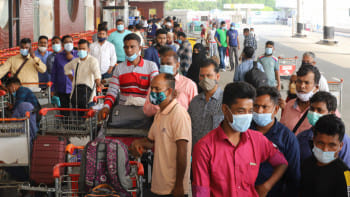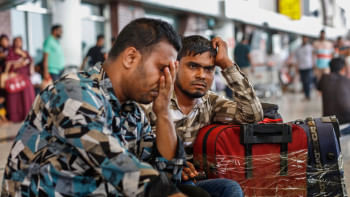Passport renewal crisis is hurting our migrants in Malaysia

We're concerned about the plight of Bangladeshi migrant workers in Malaysia who are facing uncertainties because of protracted delays in getting their passports renewed. According to a report by this daily, approximately 26,096 expatriates are in limbo as their applications for machine-readable passports (MRPs) have hit a roadblock amid severe MRP booklet shortages. For many, this means their chances of renewing their visas on time may also be jeopardised, exposing them to risks of deportation as well as abuse and exploitations.
According to a government estimate, around 15 lakh Bangladeshi migrants work in Malaysia. The present problem has its roots within the passport processing system at the Bangladesh High Commission in Kuala Lumpur. The commission introduced e-passport services on April 18 this year, but their uptake has been limited so far, with only 20,829 e-passport applications processed by October compared to 56,080 MRP applications. Reportedly, the attempt to phase out MRPs hasn't had the desired success partly because of the resistance of some corrupt elements within the embassy as it is harder to commit corruption in e-passport processing. Moreover, the shortage of MRP booklets continues to hold up applications. The recent termination of the outsourcing firm Expert Service Kuala Lumpur (ESKL)—which used to handle e-passports—may further aggravate the crisis.
We don't need reminding of the suffering and risks potentially facing the applicants. In Malaysia, expatriates unable to renew their visas due to passport delays can buy up to eight special monthly passes that allow them to remain legally in the country while awaiting passport and visa renewals. However, if the delays persist and they cannot renew their documents within this period, they must either return home or be forced to stay there illegally. Reports of a recent crackdown leading to the capture of 93 undocumented workers from various countries, including Bangladesh, show how real the threat is. Undocumented workers are also much easier to exploit for employers, and if deported back home, it means a significant blow to their livelihoods and families.
The ongoing crisis, playing out against the backdrop of the Malaysian freeze on recruitment of new foreign workers earlier in the year, shows the urgency of addressing procedural bottlenecks and irregularities to better protect the interests of our workers. As things stand, expediting the supply of MRP booklets to clear pending applications should be considered in the short term. Simultaneously, the government must scale up e-passport processing to minimise dependence on the MRP system, and take measures to swiftly replace the terminated ESKL to avoid further service disruptions. We also urge the authorities to take stricter measures to root out corruption and irregularities within the ranks of embassies. Our migrant workers—sending their hard-earned remittances to bolster our economy—deserve the best from us.


 For all latest news, follow The Daily Star's Google News channel.
For all latest news, follow The Daily Star's Google News channel. 










Comments